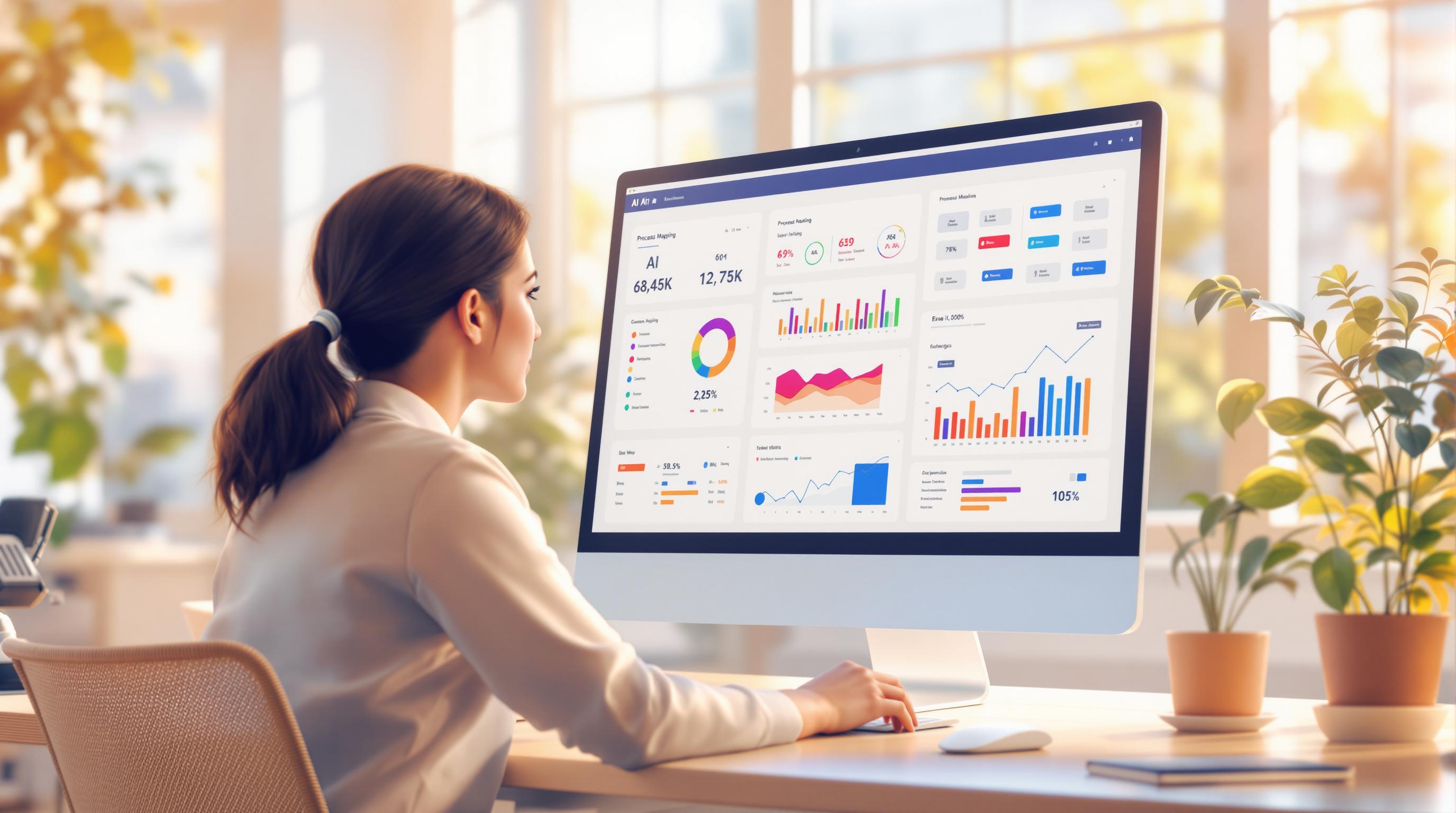AI tools are changing how hotels manage their revenue. They help hotels adjust prices, predict demand, and improve profits - all in real time. Here’s what these tools can do for your hotel:
- Dynamic Pricing: Adjust room rates based on demand, events, and weather.
- Demand Forecasting: Predict occupancy using data like past bookings, competitor rates, and local events.
- Boosting Revenue Streams: Optimize pricing for restaurants, meeting spaces, spas, and more.
- Automation: Save time by automating repetitive tasks like pricing updates.
- Smarter Decisions: Use AI insights to manage inventory and group bookings effectively.
Even small hotels can benefit from these tools with budget-friendly options and features like automated pricing and demand forecasting. AI makes it easier for hotels to maximize profits while simplifying day-to-day operations.
The 9 Best Hotel Revenue Management Systems for 2025 ...
Main Functions of AI Revenue Management Systems
AI revenue management systems reshape hotel operations by using data to fine-tune pricing strategies and automate repetitive tasks.
Demand Forecasting and Analysis
These systems dive into massive datasets to predict booking trends. Key factors they evaluate include:
- Historical booking trends
- Competitor pricing and market conditions
- Local events and seasonal fluctuations
- Weather patterns
- Economic factors influencing travel demand
With this analysis, hotels get detailed occupancy forecasts, which help with planning staffing, managing inventory, and scheduling maintenance. For instance, during large events like conventions or sports games, AI tools allow hotels to adjust pricing and inventory early, staying ahead of demand shifts.
Price Optimization Systems
AI pricing engines tweak rates in real time by considering:
- Current occupancy levels
- Competitor pricing strategies
- Customer behavior by segment
- Patterns in length of stay
- Lead times for bookings
- Costs tied to different booking channels
This real-time adjustment ensures the best price for each room type and booking window, balancing competitiveness with revenue growth.
Expanding Revenue Opportunities
AI tools go beyond room pricing to improve other revenue areas:
- Food & Beverage: Adjusting restaurant prices based on guest demand and popular menu items.
- Meeting Spaces: Analyzing demand for conference rooms.
- Spa and Recreation: Setting prices for amenities based on usage trends.
- Parking and Transportation: Managing availability based on hotel occupancy.
- Room Upgrades: Identifying upsell opportunities using guest profiles and past behavior.
By analyzing each revenue stream separately and understanding how they interact, these systems help hotels focus on maximizing total revenue per available room (TRevPAR), rather than just room revenue.
These functionalities are the foundation of AI-powered revenue management, paving the way for deeper insights and practical examples.
AI Revenue Results: Research Findings
Income and Room Occupancy Results
Studies reveal that hotels leveraging AI-driven revenue management tools see increases in both revenue and occupancy rates. By utilizing analytics and dynamic pricing, these tools help maximize revenue per available room while improving overall occupancy levels. This demonstrates how AI can streamline operations and improve profitability in the hospitality industry. Up next, we’ll look at how widely AI systems are being used today and the challenges that come with implementing them.
sbb-itb-bec6a7e
Common Issues and Fixes When Using AI
Integrating AI into revenue management can be tricky, especially when it comes to preparing staff. Ensuring your team is ready is key to making the most of AI's potential for boosting revenue.
Employee Training
To encourage smooth adoption of AI systems in revenue management, hotels should focus on:
- Structured Learning: Create training programs that cover both the technical details and real-world applications.
- Hands-on Practice: Arrange supervised sessions where employees can get comfortable using AI tools.
- Ongoing Support: Offer continuous assistance to quickly resolve any issues that arise.
Hotel-Specific AI Revenue Tools
Current Market Options
The hospitality industry now offers AI-driven revenue management tools specifically designed for hotels. These solutions use data analytics and machine learning to adjust pricing and increase revenue. Features like real-time analytics, dynamic pricing, and integration with property management systems make these tools practical for various operations. It's important to assess these features to ensure they align with your hotel's needs, especially if you're considering options tailored for smaller establishments.
Finding Tools for Small Hotels
Small and independent hotels often encounter hurdles when adopting AI revenue management tools. Resources like AI for Businesses provide curated directories to help identify budget-friendly solutions. Many of these tools offer flexible pricing plans, free trials, and tiered options, making it easier for smaller hotels to gradually implement AI.
For small hotels, here are a few tips when choosing AI tools:
- Start with essential features like automated pricing and demand forecasting.
- Opt for solutions that can grow alongside your business.
- Make sure the tools integrate smoothly with your current systems.
Summary: AI Benefits for Hotel Revenue
AI-powered analytics platforms play an important role in managing hotel revenue. By leveraging tools like dynamic pricing and demand forecasting, these platforms make it possible for staff without technical expertise to gain insights using natural language queries. This simplifies data analysis and supports smarter revenue strategies.
FAQs
How can small hotels use AI-powered revenue management tools effectively without going over budget?
Small hotels can implement AI-powered revenue management tools effectively by starting with affordable or subscription-based solutions tailored to their needs. Many platforms offer scalable pricing, allowing hotels to pay only for the features they use. Additionally, focusing on tools that provide real-time data analysis and automated pricing recommendations can help maximize revenue without requiring significant upfront investment.
To stay within budget, consider tools that integrate seamlessly with existing systems, reducing the need for costly upgrades. Prioritize solutions that offer free trials or demos, so you can evaluate their value before committing. By leveraging these strategies, small hotels can harness the power of AI to optimize revenue without overspending.
What challenges do hotels face when adopting AI for revenue management, and how can they address them?
Integrating AI into hotel revenue management systems can be challenging due to factors like data quality issues, staff training needs, and high initial costs. AI tools rely on accurate, comprehensive data to provide actionable insights, but incomplete or inconsistent data can limit their effectiveness. Additionally, hotel staff may require training to fully understand and utilize these systems, which can be a time-intensive process.
To overcome these challenges, hotels should focus on improving their data collection and management processes, ensuring that the data fed into AI systems is clean and reliable. Investing in staff training programs to build confidence in using AI tools can also help maximize their potential. Starting with scalable, cost-effective AI solutions can reduce upfront expenses and allow hotels to gradually expand their capabilities as they see results.
How can AI tools enhance revenue from hotel amenities like restaurants and spas, and what effect does this have on overall profitability?
AI tools can significantly improve revenue from non-room amenities such as restaurants, spas, and event spaces by leveraging data-driven insights. These tools analyze customer preferences, seasonal trends, and spending habits to create personalized offers, optimize pricing, and enhance the guest experience. For example, AI can recommend targeted promotions, adjust spa pricing based on demand, or suggest menu items tailored to guest preferences.
By improving efficiency and tailoring services to customer needs, these tools help maximize revenue from all areas of the hotel, not just room bookings. This holistic approach to revenue management can lead to higher guest satisfaction and a notable boost in overall profitability.


